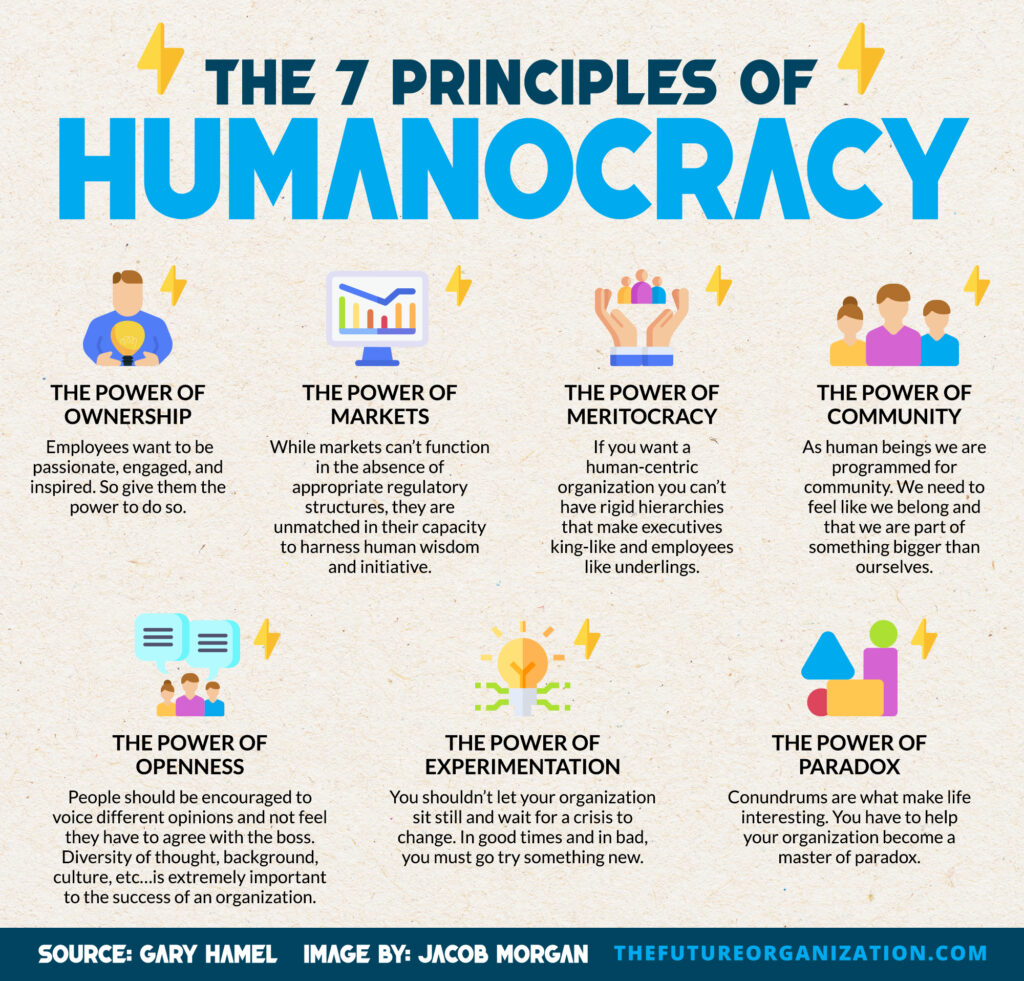How much do you trust your people?
According to best-selling author Gary Hamel, one of the biggest factors stopping organizations from moving away from bureaucracy is that leaders don’t trust their people.
But that lack of trust creates a cycle where leaders feel they have to treat their employees like children because they can’t be trusted, which makes employees stop making decisions on their own.
When leaders try to control every aspect of the work, employees aren’t motivated to innovate and experiment. This lack of trust and motivation creates a never-ending cycle of bureaucracy.
Organizations can’t rely on bureaucratic measures in the future of work. They have to find a better way to lead and create human-centric organizations.
Hamel refers to this approach as humanocracy, or relying on people instead of rigid rules and procedures.
Here are the seven principles of humanocracy. These ideas put people at the center of the organization and empower employees with trust instead of making them work through red tape.
The Power of Ownership
Employees want to be passionate, engaged, and inspired, so give them the power to do so. Make sure employees know the value of their work and how it contributes to the company’s goals so they can take ownership and foster great ideas.
The Power of Market
Markets need appropriate regulatory structures to function and are unmatched in their capacity to harness human wisdom and initiative.
The Power of Meritocracy
People-centric organizations don’t have rigid hierarchies that make executives feel like kings and employees feel like underlings. They support all employees and give them room to grow.
15 Top CEOs Share Their Best Leadership Lessons
Learn from the CEOs of Netflix, Honeywell, Volvo, Best Buy, The Home Depot, and others.
Get the PDF→
The Power of Community
Humans are designed to be part of communities. Employees need to feel like they belong and know that they are part of something bigger than themselves. A sense of community is powerful in motivating employees to make the world a better place and put in their best work.
The Power of Openness
People should be encouraged to voice different opinions and not feel that they have to agree with the boss. Diversity of thought, background, culture, and more is extremely important to the success of an organization.
The Power of Experimentation
The most successful companies are always moving forward instead of waiting for a crisis to force them to change. Empower your people to try new things and push the company forward, even during good times.
The Power of Paradox
All organizations face challenges and conundrums, but that is what makes life and business interesting. You have to help your organization become a master of paradox and thrive in the unknown.
It’s the people-centric organizations that will lead in the future with innovative ideas and practices. Let go of bureaucracy to put people first and build their trust.

_______________________________________________________________________________
If you enjoyed the article and want more content like this here’s what you can do:
- Subscribe to The Future of Work Podcast where I interview business leaders around the world each week.
- Grab a copy of The Future Leader which has been endorsed by the CEOs of MasterCard, Best Buy, Oracle, Audi, Unilever, Domino’s Pizza, Ritz Carlton, Kaiser, and Marshall Goldsmith. It explores the most essential skills and mindsets for future leaders.
- If you are or want to be an entrepreneur then my wife and I just launched a brand new podcast on how to Be Your Own Boss, called the BYOB Podcast where we share what we did and how we did it. You can subscribe to that here.
